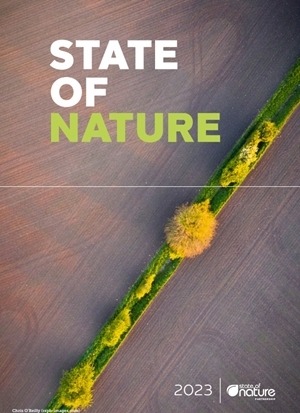“But the reasons for the decline are clear and we know conservation actions deliver results for nature. We have never had a better understanding of the State of Nature and what is needed to fix it.”
.

The State of Nature Report 2023, “the most comprehensive report on the UK’s current biodiversity” has just come out, showing that there is “no let-up in the decline of our wildlife”:
The UK’s wildlife is continuing to decline according to State of Nature Report 2023. The UK, like most other countries worldwide, has seen significant loss of its plants, animals and fungi. The data from State of Nature cover, at most, 50 years but this follows on from centuries of habitat loss, development and persecution. As a result, the UK is now one of the most nature-depleted countries on Earth. But the reasons for the decline are clear and we know conservation actions deliver results for nature. We have never had a better understanding of the State of Nature and what is needed to fix it.
And yet on its homepage, it does stress that “conservation actions deliver results for nature”, highlighting what has happened in the Lyme Bay Marine Protected Area, where the number of species has increased since trawling was banned in 2008:
In England’s Lyme Bay, fishermen, conservationists and the government are negotiating new ways to protect fishing and nature
Plus, there is encouragement to ‘help nature’ – and in these parts, that includes the Sid Valley Biodiversity Group, the Sidmouth Arboretum and even the likes of Friends of Glen Goyle – and other groups highlighted in this excellent organigram from Stefan Drew of the SVBG.
Nevertheless, the latest State of Nature report is devastating, with more than 40 wildlife charities and climate activist organisations gathering outside the government’s environment department demanding ministers take stronger action to restore nature:
Outside the Department for Environment, Food and Rural Affairs building in Westminster, representatives of organisations including the Wildlife Trusts, WWF, the RSPB, Extinction Rebellion, Just Stop Oil and Green New Deal Rising blocked the road with large colourful banners and listened to speeches from scientists angered by the State of Nature report’s findings.
Naturalist and TV presenter Chris Packham, who organised the protest with two other people in nine days, said: “When a report says that 16% of your monitored species are in danger of extinction – one in six – you are in deep trouble. We have to act far more rapidly, and that’s why I’m keen to motivate these charities to ask their membership to stand up and be counted to take more action than we have done. I’m afraid these days that means taking to the streets in a peaceful, democratic way as we have done this morning. No paint, no powder, no gluing ourselves. People have been motivated by love, deep rooted affinity and concern for nature. And they’re running out of patience when it comes to nature’s recovery.”
Even though no gluing was involved, a question is whether such high-profile campaigners motivate or anger the wider public, with the Daily Mail putting it slightly differently, referring to BBC Springwatch star Chris Packham threatening to take to the streets unless more is done to save the environment – after saying it is ‘ethically responsible’ for an eco mob to break the law and warning an oil refinery could be blown up.
And yet, looking at the previous State of Nature report from 2019, there were similar warnings about the steep declines in wildlife. And the 2023 report shows there is little sign in recovery, using the same baseline:
Since 1970, the abundance of the species studied in the report has declined on average by 19%, and nature continues to be in freefall... The report found the intensive way in which we manage our land for farming and the continuing effects of climate change are the two biggest drivers of nature loss.
The National Farmer’s Union president has said “farmers can and must do more” – and yet farming continues to have a major effect on the amount and quality of our wildlife.
Finally, then, local groups in the Sid Valley are working with landowners and other key stakeholders to enhance habitats and biodiversity. Why not join a group involved in monitoring wildlife, volunteering and looking to a more sustainable lifestyle?
…